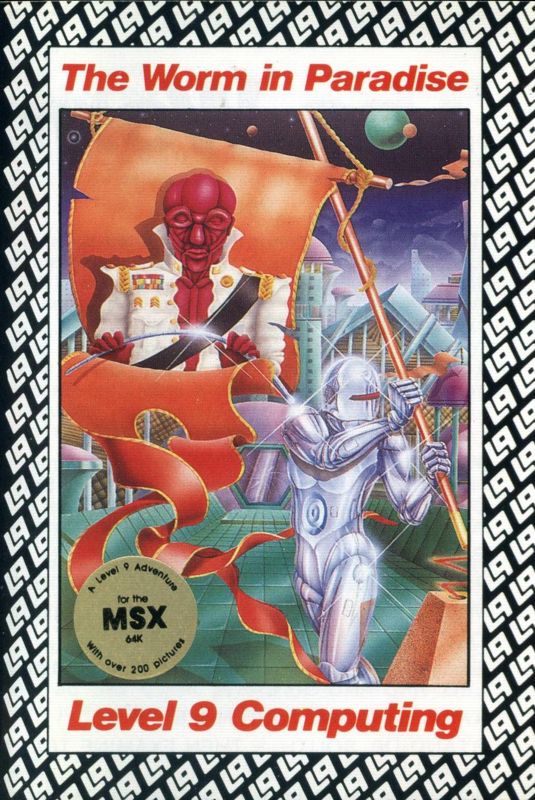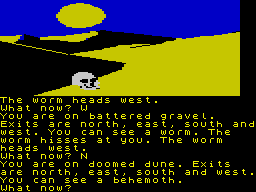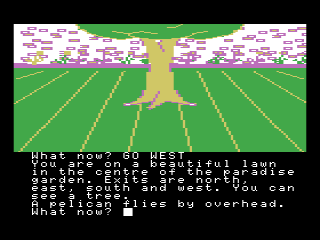Retro Replay Review
Gameplay
The Worm in Paradise offers a remarkably disciplined interactive fiction experience centered around a strict day/night cycle and a decimal clock system. As you navigate the domed city of Eden, every action is framed by the ticking of ten 100-minute hours, demanding meticulous planning and time management. This design choice enhances the tension: failing to return home before darkness not only halts progress but also removes the safety net of robotic assistance.
Central to the gameplay is the use of colour-coded coordinates that guide you to vital buildings and hidden locations. Each time you load the game, these coordinates shuffle, making it essential to maintain careful, handwritten notes. This old-school approach to puzzle-solving rewards patience and attention to detail, but it can also feel unforgiving to newcomers who expect more forgiving save systems or in-game journals.
Puzzles range from procuring body parts for the hospital’s lucrative trade to circumventing robot-controlled checkpoints and deciphering the rigid fines-based economy’s loopholes. Robots handle nearly every task in Eden, so your role often boils down to exploiting the system rather than performing manual labor. This meta-commentary on humanity’s obsolescence provides both challenge and dark humor, as you unravel ways to restore human relevance in a world that has automated us out of purpose.
Graphics
True to its interactive fiction roots, The Worm in Paradise relies entirely on text-based descriptions rather than visual sprites or rendered scenes. While some may view this as a limitation, the prose is clear, evocative, and rich in detail—painting the domed metropolis of Eden, its sterile corridors, and the ever-present hum of robotics with surprising vividness.
The game’s interface uses minimalistic elements: a blinking cursor, concise status lines showing time and location, and occasional colour highlights in the coordinate readouts. These subtle touches help keep the experience streamlined and focused on imagination rather than on pixel-count or texture fidelity. For players accustomed to modern graphics, the stark presentation serves as a nostalgic reminder of the genre’s formative days.
Despite the absence of traditional visuals, ambiance is conveyed through well-crafted environmental descriptions. You’ll feel the sterile chill of robotic clinics, the oppressive order of Eden’s domes, and the unsettling quiet that settles when you’re the only human left performing a task. It’s a testament to strong writing that you can “see” the world so clearly without a single sprite.
Story
The Worm in Paradise unfolds in a society where Eden’s colonization has achieved an impossible utopia: crime, poverty, and unemployment have been eradicated. In this world, every aspect of life is regulated by petty fines rather than taxes, creating a labyrinth of trivial rules. Rule infractions can bankrupt you faster than earning a living, and penal punishment has all but disappeared in favor of robotic compliance.
What truly gives the narrative its bite is the revelation that humans have been rendered practically useless. Robot employees oversee infrastructure, manage reproductions, and even broker body part transactions for hospital profit. The result is a chilling commentary on the extremes of automation and the loss of human agency. Your quest becomes more than a series of puzzles—it’s a moral wake-up call to reclaim human worth in the face of machine supremacy.
As the culmination of the Silicon Dreams trilogy, The Worm in Paradise builds on the philosophical underpinnings of Return to Eden and its predecessor. Characters you meet, from weary technocrats to rebellious underground factions, illustrate both complacency and defiance. Their stories add emotional depth to your mission, transforming what might have been a mere puzzle gauntlet into a thought-provoking exploration of dystopian paradise.
Overall Experience
Playing The Worm in Paradise feels like delving into a retro-futuristic novella where you are both the protagonist and the critic. Its unforgiving clock, randomised coordinates, and pen-and-paper note requirements can frustrate players more accustomed to modern quality-of-life features, but those who embrace its old-school challenge will discover a rewarding, absorbing journey.
The game’s strengths lie in its sharp social satire, cleverly designed puzzles, and immersive world-building conveyed through text alone. While the lack of graphics might deter some, the laser focus on narrative and mechanics creates a uniquely minimalist experience that few modern titles attempt. Fans of interactive fiction will find familiar comfort in its parser, while newcomers will be tested by its unforgiving structure.
Ultimately, The Worm in Paradise is more than a nostalgia trip—it’s a thought-provoking invitation to question our reliance on technology, the value of work, and what constitutes genuine paradise. For those seeking a cerebral challenge wrapped in a richly described but mercilessly timed environment, this game is an essential addition to any interactive fiction collection.
 Retro Replay Retro Replay gaming reviews, news, emulation, geek stuff and more!
Retro Replay Retro Replay gaming reviews, news, emulation, geek stuff and more!









Reviews
There are no reviews yet.